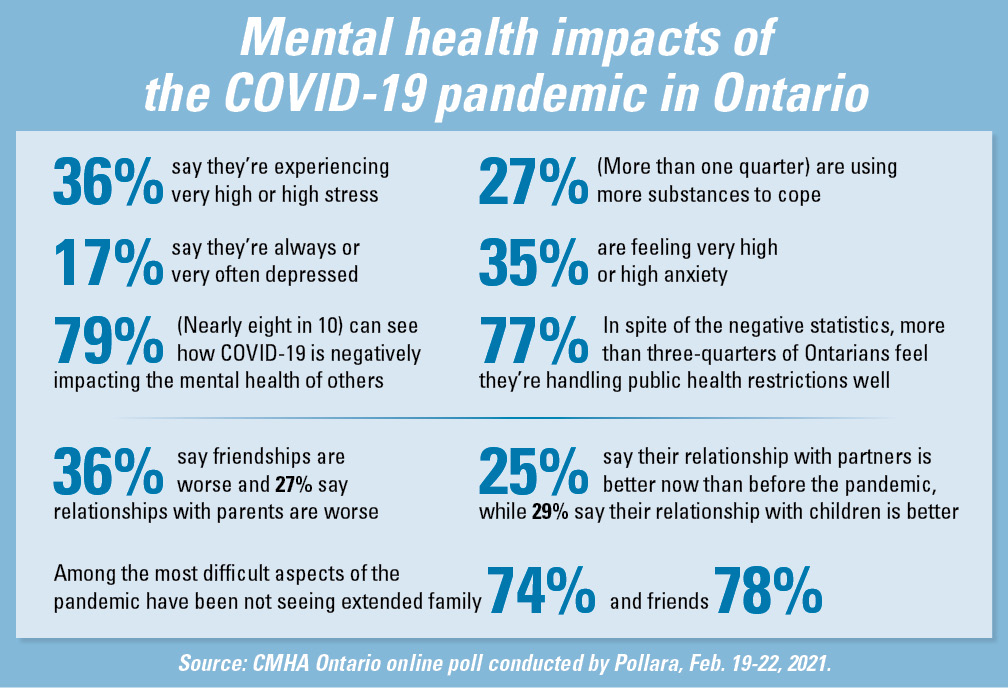WELLINGTON COUNTY – Experts say Canadians’ mental health has been put to the test, with stress, anxiety and depression at all-time highs due to the COVID-19 pandemic.
Helen Fishburn, CEO of the Canadian Mental Health Association Waterloo Wellington (CMHA WW), said “the very things that people rely on to stay healthy, to stay connected, to stay supported, and to stay grounded are a lot of the things we have not been able to do.”
Joanne Young Evans, executive director of Family Counselling and Support Services for Guelph Wellington (FCSSGW), added the pandemic “has brought to light these things that we previously took for granted, like how important the human connection and seeing people face to face are.”
Not having access to these external comforts has increased stress, anxiety, irritability and depression levels in just about everyone, said Young Evans.
“The research has shown that only 35 per cent of people felt excellent or very good about their mental health – I’m surprised it’s that high” she said.
Last May that number was recorded around 52%, according to CHMA polls.
With the added stressors and inability to access the things that bring comfort, the resilience of Ontarians has been depleted, said Fishburn.
“If you think about the pandemic as waves in a tsunami, which is really what it has felt like, there was the big first wave and then the water was a bit calmer, and then a second wave and the water is a bit calmer now, but each wave gets more destructive,” she said.
“People are already exhausted, their ability to swim in that water gets more and more challenging.”
This is shown by the growing call volumes to help lines like CMHA’s Here 24/7, which has seen a 30% increase to calls since the start of the pandemic.
FCSSGW has also seen a huge increase in calls to its support line from people looking for help, said Young Evans.
She noted that pre-pandemic the organization’s call line was getting around 100 calls a month, but it now received on average 2,000 calls a month.
The severity of the calls is getting worse as well, said Young Evans, adding over 40% of people who come to FCSSGW for aid are listed as serious occurrences, meaning they are thinking of suicide, they’ve already attempted suicide or they are harming themselves.
On top of that, she said, rates for spousal and child abuse are growing and “about 17 to 20% of the women who walk in to FCSSGW are being abused in some shape or form.”

According to a poll conducted by CMHA, nearly nine in 10 (88%) Canadians believe that the longer the pandemic continues the more severe the impact will be on mental health.
“This isn’t going to end overnight, it’s going to take people months, possibly years, to get past trauma that they have experienced in this past year,” said Young Evans.
She said she is especially concerned about young children growing up during this time that are going to have to learn how to integrate into a normal society after knowing nothing but social distancing and masks.
Fishburn said she believes people are doing everything they need to be doing to reduce the impacts of the pandemic by following public health guidelines.
“That is job number one, to physically protect ourselves, because if you think about it, if we aren’t doing that and we catch COVID and unknowingly give it to someone else you know, that is terrible for our mental health as well as our physical health,” she said.
“That really makes people upset, depressed, anxious worried, to get put into that position.”
Fishburn added she feels very strongly that people can continue to meet their mental health needs while following the guidelines, even though it will be difficult.
“The most important thing for them is to not sit with it on their own,” said Fishburn.
Seeking out help is extremely important for anyone struggling with their mental health and it’s no different then seeking out help when you are in physical pain, she explained.
“If you have a tooth ache, and your tooth starts to hurt and you do all the things that you normally do – you brush your teeth, you floss, but that tooth ache isn’t going away – it’s going to get worse and it going to turn into an infection,” Fishburn said.
“Mental health is the same thing. Mental health is about pain. A person’s life is painful because of whatever condition they might have.”
According to CHMA, nearly eight in 10 Canadians said they could see the impact the pandemic has had on the mental health of others around them.
Anyone who is struggling can find help on CHMA’s website www.CHMA.ca, and on their phone line, 1-833-456-4566, where you can talk to someone 24 hours a day.
The Family Counselling and Support Services support line is 1-888-821-3760.




